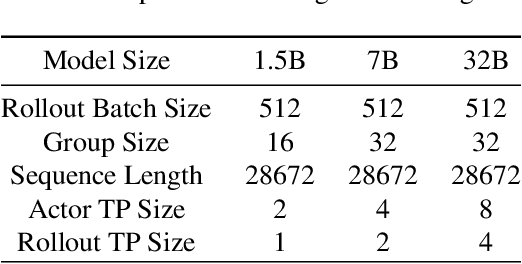Mingjie Wei
RLinf: Flexible and Efficient Large-scale Reinforcement Learning via Macro-to-Micro Flow Transformation
Sep 19, 2025



Abstract:Reinforcement learning (RL) has demonstrated immense potential in advancing artificial general intelligence, agentic intelligence, and embodied intelligence. However, the inherent heterogeneity and dynamicity of RL workflows often lead to low hardware utilization and slow training on existing systems. In this paper, we present RLinf, a high-performance RL training system based on our key observation that the major roadblock to efficient RL training lies in system flexibility. To maximize flexibility and efficiency, RLinf is built atop a novel RL system design paradigm called macro-to-micro flow transformation (M2Flow), which automatically breaks down high-level, easy-to-compose RL workflows at both the temporal and spatial dimensions, and recomposes them into optimized execution flows. Supported by RLinf worker's adaptive communication capability, we devise context switching and elastic pipelining to realize M2Flow transformation, and a profiling-guided scheduling policy to generate optimal execution plans. Extensive evaluations on both reasoning RL and embodied RL tasks demonstrate that RLinf consistently outperforms state-of-the-art systems, achieving 1.1x-2.13x speedup in end-to-end training throughput.
ACMo: Attribute Controllable Motion Generation
Mar 14, 2025Abstract:Attributes such as style, fine-grained text, and trajectory are specific conditions for describing motion. However, existing methods often lack precise user control over motion attributes and suffer from limited generalizability to unseen motions. This work introduces an Attribute Controllable Motion generation architecture, to address these challenges via decouple any conditions and control them separately. Firstly, we explored the Attribute Diffusion Model to imporve text-to-motion performance via decouple text and motion learning, as the controllable model relies heavily on the pre-trained model. Then, we introduce Motion Adpater to quickly finetune previously unseen motion patterns. Its motion prompts inputs achieve multimodal text-to-motion generation that captures user-specified styles. Finally, we propose a LLM Planner to bridge the gap between unseen attributes and dataset-specific texts via local knowledage for user-friendly interaction. Our approach introduces the capability for motion prompts for stylize generation, enabling fine-grained and user-friendly attribute control while providing performance comparable to state-of-the-art methods. Project page: https://mjwei3d.github.io/ACMo/
 Add to Chrome
Add to Chrome Add to Firefox
Add to Firefox Add to Edge
Add to Edge